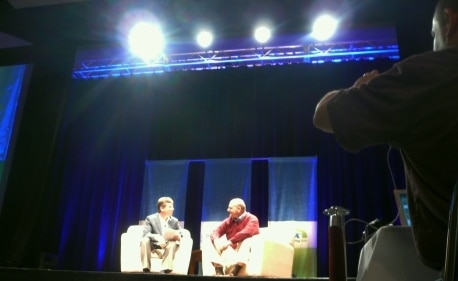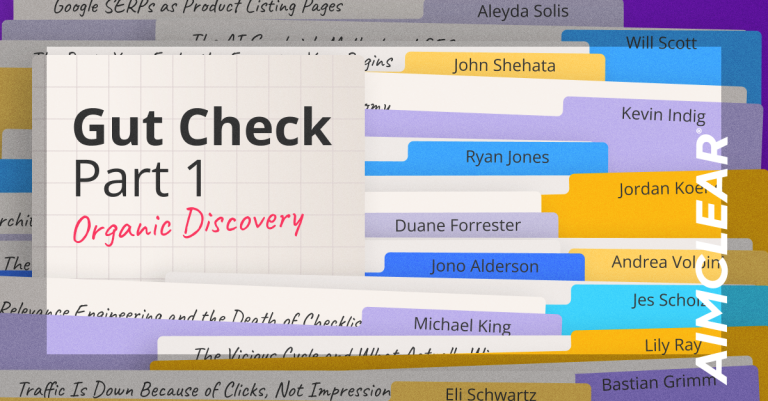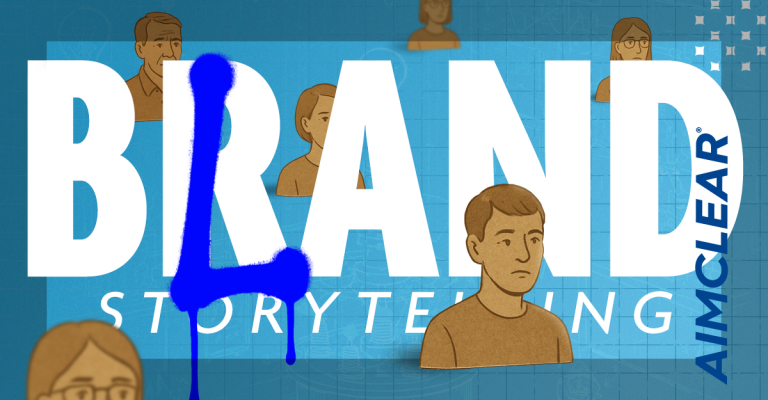
When it was first announced that Microsoft’s Steve Ballmer would be keynoting this year’s SMX West, it was perceived as a nice surprise and unexpected legitimization of the search marketing industry from one of the big guys. The announcement left many marketers existentially pondering their role in the somewhat dysfunctional search family.
Did Ballmer, Microsoft, & Bing finally release SEOs from their search-kennel to offer them a seat at the dinner table? Or was it a pat on the head… an assurance that were are, indeed, “a good boy?”
With Joe Walsh blaring, Ballmer and moderator Danny Sullivan took (shook? no, took…) the stage to address a room packed full of SEOs, the press, and other people who wear glasses. Danny asked a gamut of questions while Ballmer spoke candidly about the current state of the Bing and Yahoo, Google-gripes, mobile search and evolution of the search business model.
Danny Sullivan: The deal with Yahoo is a go-ahead. You’re looking at having ads running by maybe by the end of year/ beginning of 2011… how’s this going to help advertisers and search users?
Steve Ballmer: At the end of the day, folks understand as well as anybody that the quality of search engines depends heavily on the relevance of the advertising and the relevance of the advertising depends on the density of bids. The ability to put these volumes together improves the experience for all involved parties. More eyeballs on one campaign. From the user standpoint it means the opportunity to see more relevant ads. There’s also an opportunity to scale, to get more relevance
Sullivan: Greater scale and volume is for searchers as well?
Ballmer: Well, we’ll get better signals; we’ll do a better job tuning relevance for searchers.
Sullivan: You’ve been aggressively going after the search market share, but so far we haven’t had any big game changers that shifted the markets share, what opportunity is out there?
Ballmer: It’s really important to be in the game and making real progress with a differentiated point of view, I certainly think that are user experience does both those things, but total game changer? We’ll get there. The world is so dynamic that we are finding opportunity for game changers. Social, mobile, real time, it’s still open. as far as the business model of search, we haven’t figures out how to remake this yet, but for instance, we’ve done experiments with cash backs.
Sullivan: Can you be #1 in the US in terms of market share?
Ballmer: There’s no good answer to this question. If you say “yes” you sound arrogant, say “no” and you have no faith. The answer is “Yes… someday.”
(Audience applauds like a bunch of super-cool cows who are all best friends, plus they all have the same birthday.)
Most people don’t do things with the goal of being second, yet a fair degree of realism is required regarding the current state of fairs. it’s a really competitive market, everyone should appreciate and benefit from that fact that the level of competition in search has certainly ramped up in the last couple of years.
Sullivan: You don’t aim for # 2, but would you be happy to be there?
Ballmer: No. Well ask me if I’m happy tomorrow. We’ve got great long termed optimism. Tomorrow’s goal is to gain a few tenths of a percentage, maybe a point, keep working and working and working.
(Ballmer pumps his fists forward in motion like those two pumpy-things on locomotives that no one knows the name of.)
Sullivan: Is Yahoo going to survive as a search player? You want to beat them… aren’t you going to just kill them?
Ballmer: For us, the goal is to expand the total amount of searches that are on our platform. Yahoo has a lot of flexibility in the contract that they sign regarding how they go do that. Economically they are still able to compete in the search business.
Sullivan: They are going to be successful along with you, yet you want to be more successful on top of them?
Ballmer: The number one objective is for Bing to be the best search product that it can be, but there is an advantage of the power of two as opposed to the power of one.
Sullivan: There was a Wall Street Journal article that said Microsoft is jumping behind third parties to compete against Google regarding recent antitrust issues.
Ballmer: We put a blog post up that better explains our position, which we’re being very open about. What’s lawful and unlawful is the per-view of the regulators, and don’t we know it. A lot of times initial complaints will come from a competitor, which we are. The post makes it clear that we see greater issues and we aren’t going to be silent about them.
Sullivan: In the post, it says that in the talk with the EU to ensure everything goes well with Yahoo, you seemed to think that Google was doing things that weren’t legal.
Ballmer: Legal is determined by regulators, but we comment when we have publishers and advertisers that are sharing some of their issues with us. What is a marketer allowed to do? how much data do they get back from the performance of their campaigns. There’s a whole set of things that if you take a vote of the whole audience, you’ll find there’s a lot of frustration.
Sullivan: Anyone frustrated with Google? Anybody? One person out there…
Ballmer: Well then there’s no issue.
Sullivan: You mentioned that there was a lock in for advertisers that seemed made it harder for Microsoft to gain volume. What is this lock in are you talking about?
Ballmer: A number of things, but let’s not itemize. There exist a number of places where it is very hard to break through, and there’s nothing wrong with having a strong position. We have a strong position in the OS market. I would love for advertisers to share what their experiences is on Google, but only if we have the right support. There are a number of things Google holds proprietary that don’t facilitate such feedback. Also the Google book deal… that doesn’t seem right to me, let alone publishers’ rights.
Sullivan: So does that mean you’re going to jump back into books? You guys jumped out of books two years ago. Will that change? Will we get a Bing book?
Ballmer: We are participating in a consortium albeit at a different level of investment. We want a level playing field with level returns to publishers and developers.
Sullivan: What about china? What does Google pulling out mean for Bing?
Ballmer: The real force in China isn’t Google or Bing, it’s Baidu. In some sense it’s relevant to market around the dynamics in China. Anyone who wants to be a real competitor needs to see what it means to compete or partner effectively with Baidu. I don’t know whether anything will change for Google though.
Sullivan: Over the past two years, you guys have had a ton of distribution deals, yet FireFox doesn’t list Bing as a recommended partner. Are you going to yell at them?
Ballmer: I’ve found yelling when you’re trying to sell to someone isn’t very effective!
(Ballmer yells comically like a comical dad in a 90’s movie.)
Ballmer: We’d love to have more distribution partners.
Sullivan: With FireFox it’s all about quality and perspective over there. From my perspective you guys are very relevant. What are they telling you that’s different?
Ballmer: At the end of the day it’s about distribution deals and that’s their current perspective. We’re going to continue to improve development, monetization and distribution of our product.
Sullivan: Another deal is that you’re going to be powering search on the iPhone.
Ballmer: I read that rumor. I was in Europe when I read it after a journalist asked me about it.
Sullivan: Is that something you want to do?
Ballmer: That’s sort of wild stuff, what we want to do is provide a very good search product on the iPhone. We already have a “Bing for iPhone app” other than that, I’ve read rumors. You asked me earlier about the power of partnership. We will have multiple forms of Bing being promoted in different distribution deals, by us, by Yahoo, by others etc. Part of it is selling partners on the ability of Bing distribution. The story starts with the core Bing experience.
Sullivan: When it first came out, Bing for iPhone was 1 of the top 5 free apps. Did that surprise you?
Ballmer: No, it didn’t. We knew it would get a lot of curiosity, and if you take a look, people do like that it is free. It did not shock me… it was very nice, let’s just say.
Sullivan: I saw one report stating that the queries that you get from iPhone are in excess from the mobile queries you get from Verizon.
Ballmer: We get a commercially valuable set of queries from the iPhone, but we get better queries on balance than we anticipated on all platforms. But the average value of queries of all mobile platforms is better than expected.
Sullivan: Will people have the option to switch engines in the Windows 7 phone?
Ballmer: At least in places where the phones are subsidized, the operator is critical in this situation. My guess is we won’t get a huge amount of support for Windows phones with operators for people who don’t want Bing.
Sullivan: Will we get an official Bing app for Android?
Ballmer: That’s a little bit more complicated. We’re going to see how the Android market develops, what ends up being popular. It is a little bit tricky to understand where the opportunity lies for the Android.
Sullivan: Are we finally at the year of the mobile?
Ballmer: We are at a year of mobile. Queries are going to keep going up reflecting the number of devices and the usage patterns. We’re not going to see a drop in queries from PCs, but we are going to see a rise in total volume. For a lot of people, they won’t even feel that much different, since we are getting browsers on phones. It’s going to feel very similar, but there is a query that’s distinctly mobile
Sullivan: Do you search when you’re out on the move?
Ballmer: Too much, particularly when my wife thinks I should be driving. I only have a phone when I’m in the car. It’s impolite for me to bring phones to most meetings. Mostly I have the phone in the car and I do have to be very careful.
Sullivan: If Google’s company culture plays an important part of their success in search, is there something fundamentally different for Microsoft?
Ballmer: I don’t work there. I can’t comment, really. The truth of the matter is the number one thing Google benefits from in search is they did it right first. Put culture aside, and we started later. There’s a value to incumbency. Which came first, incumbency or culture? It’s never clear. We have a lot of talented people and innovations in terms of culture, we got everyone moving faster than before there was Bing. What does that say about our culture?
Sullivan: How big a chunk of Microsoft do you see search becoming? It’s is going to be a huge profit things.
Ballmer: Didn’t’ we answer that earlier, in terms of market share? I don’t know how long it will take. The truth of the matter is we do have ambitions to grow. Also, ask what’s going to happen overall in the economics of search engines in the future. Take our OS business, where we’re getting attacked from all different people with different business models. It’s very hard to predict, but I think it’s going to be an ever-growing share of Microsoft profits. First it has to break even, then to profitability… but it’s a growing share.
(Audience laughs like a bunch of freaked out teens during a scary story at a slumber party.)
Sullivan: What have you found different about going into search as 0pposed to software products?
Ballmer: The dynamics of an auction supported/advertiser supported business work really simple and beautiful. The dynamics of business model competition are fascinating compared to almost anything on the planet. We now have a lot of experience and understand the moves we need to make, but there are a whole set of innovations set to come around business models.
Sullivan: What percentage of your time is taken up by search these days? Are you out at the Bing-plex a lot?
Ballmer: We’ve got 7-8 big business, plus a lot of customers. I’m generally working on the things that are at the intersection. What is the next frontier for how Windows, Internet Explorer and search should interact? What is the frontier between search and office? Between Bing and Xbox, and TV? When it gets to actually driving the search team, we’ve got great people. I tend to give more constructive criticism than praise. Always new frontiers, sets of queries where we can do better. I’ve fallen in love with real-time search. Nothing better than Bing-Twitter search
Sullivan: You mentioned Twitter. Buy them? Should you?
Ballmer: Not clear… we’ve got a great relationship and partnership. I’d hate to not have that partnership. But where we need to own that company is not clear. Would they have the same favor with the user community if there were held captive? That’s not clear.
Sullivan: Are you going to get out on Twitter like Bill Gates and start sharing? You should be yelling at us on Twitter.
Ballmer: Yelling? Selling!
(Shakes Sullivan in a friendly way… like an excited and physically stronger than expected high school bowling coach.)
The truth is, not terribly much. The things I want to say broadly I can say on a webpage as opposed to through tweets. If I was tweeting basketball scores myself you wouldn’t know it, but if you were a parent in the lakeside basketball program, you would have appreciated it.
Sullivan: You talked Twitter… what about Facebook? Should you have the whole thing?
Ballmer: Again, great partnership, very nice job they’re doing. They very much want to be an independent company. That’s good for them and good for us. We think that great collaboration between them and us will permit best experience for the searcher and the Facebook user.
Sullivan: Can you remember that last piece of feedback that you gave for Bing?
Ballmer: Key lime pie. It was a recipe for my wife. It was with the new recipe function we unrolled. It didn’t work exactly how I wanted to, but try searching for “key lime pie” now! We are a religiously pro-Bing family.
Sullivan: Have you considered renaming your children Bing?
Ballmer: Never thought about that one.
(Eyes blaze golden fire.)
My dad worked at Ford… I still drive a Lincoln, and 40-50 years from now my kids will still be using Bing!
Sullivan: Right now, what would you like to see Bing do better in?
Ballmer: We’ve done a great job in user experience. One: I think we have to consolidate some of the things we’ve done, with usability. Two: we’re absolutely onto the right thing with making decisions and take action. There’s a lot more we can do in the user experience to drive them. What kind of relationships can we build with SEO’s and website operators to make sure we’re on the right wave-lengths? Three: there’s still great opportunity for us to improve relevance, especially on tail queries. Then we gotta take the show on the road, in the UK, in Canada etc.
Sullivan: What are you happiest about?
Ballmer: Bing maps. I love our current service. My favorite Bing map thing is the Newseum app, from the news museum in Washington. You can drill down and see the front page of the newspaper in hundreds of cities around the world. Like what’s being said on the front page of the newspaper in Athens.
Sullivan: What’s the biggest opportunity in search that’s out there?
Ballmer: It ties back to the notion of action – the biggest opportunity is trying to help people get done what they’re trying to get done. About a year and half ago, I literally wanted to get statistics of debt as a percentage of GDP. You can search, get this website, that website, get a mix of facts, cut and paste. I just wanted the search engine to get the data and put it in a spreadsheet for me. It shouldn’t be that hard! We understand more about user intent, more about the data and structure of the data.
Sullivan: That’s sort of like Wolfram Alpha, with whom you have a partnership.
Ballmer: Right. Just ask, “How do you understand user intent and structure data out of unstructured data?”
Audience Question Time
Question: I’m curious about the cash back program. Did it work, and will you be investing more the same or less in the next months?
Ballmer: It has worked. It hasn’t worked fantastically in the sense that it changed the economic structure of the business. It’s certainly had positive results. I see us continuing to do it, to rethink it, to make it more potent and important for the merchant and the user.
Question: I was impressed with Windows 7 phone… where does Microsoft really see the money to be made with mobile going forward? You’re not going to remove the licensing fee… does Microsoft look more to licensing or app monetization?
Ballmer: Yes! But let’s stop and take it outside of the specific Android debate. The iPhone makes money with a licensing fee. If you offer a phone of high value, there’s money to be made. We happened to do that with manufacturers. Is there money to be made with apps? The answer is yes. We’ll seek to build multiple revenue streams around the phone with advertising, and search based services, as well as basic licensing fee on the OS itself.
Question: Do you feel there will be monetization of apps, or will HTML5 put an end to that?
Ballmer: HTML5 is apps. How you construct something and how you monetize it only have the vaguest of relationships. I don’t think that HTML5 standard will be identical in all iterations.
Question: You had mentioned the “open religion” with mobile. Do you see Flash as a component that would be out there, what about Silverlight?
Ballmer: We continue to push forward with Silverlight, which is on 30-40% of all PCs. We chose to support Flash for schedule based reasons on Windows 7 phone. I do think it is interesting that Windows apps will be important, iPhone apps will be, Xbox apps, certainly HTML apps, if I can call them that. But it also looks like there will be another important app and that will be the Flash/Silverlight app – moving forward both as competition and a partnership.
Question: Does PPC monetize on mobile?
Ballmer: Some people do click, hence my surprise on mobile monetization. What happens today mostly is that people do a general internet search, get a page back, and they find an advertisement. In a general case, there needs to be more innovation. An ad is not a bad thing if it is the most relevant thing in a search. How do you bring this together, and rethink the fundamental UI and experience of search? One of the things we have to spend time thinking about is the evolution of privacy and confidentiality in the user experience. Different users have different needs. My bias is that these needs and privacy are important, and let’s optimize around that. Still, people will say “If you offer me better service, I might be willing compromise on privacy.” I’m curious to know whether this is a major issue on people’s minds. I’d love to hear someone just frame how they think is an issue.
(Audience is silent, but you can’t hear crickets chirping or anything.)
Sullivan: Solutions, concerns, design input?
Ballmer: From the search engine perspective, certainly it’s a little more in our minds post Google Buzz.
Sullivan: I have two boys, 8 and 11, who are just slaughtering me on Xbox. I was searching Bing for secret god codes. Any you’d like to share?
Ballmer: Wanna know a secret? Get younger fast! My kids do that, too. I don’t have the same manual dexterity. Cloudy outlook on that one. Ten thousand hours on Xbox and you can be as good as your eight year old.








